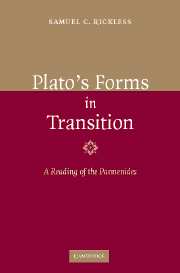Book contents
- Frontmatter
- Contents
- Preface
- List of abbreviations
- Introduction
- Chapter 1 The theory of forms
- Chapter 2 The theory criticized
- Chapter 3 The theory modified: methodology
- Chapter 4 The First Deduction
- Chapter 5 The Second Deduction
- Chapter 6 From the Appendix to the Fourth Deduction
- Chapter 7 From the Fifth to the Eighth Deduction
- Conclusion
- References
- Index of forms discussed
- Index of Deductions
- Index of passages cited
- General index
Introduction
Published online by Cambridge University Press: 22 September 2009
- Frontmatter
- Contents
- Preface
- List of abbreviations
- Introduction
- Chapter 1 The theory of forms
- Chapter 2 The theory criticized
- Chapter 3 The theory modified: methodology
- Chapter 4 The First Deduction
- Chapter 5 The Second Deduction
- Chapter 6 From the Appendix to the Fourth Deduction
- Chapter 7 From the Fifth to the Eighth Deduction
- Conclusion
- References
- Index of forms discussed
- Index of Deductions
- Index of passages cited
- General index
Summary
The theory of forms was set up on the basis of a contrast that employed provocative predicates: forms were free of identity crises by virtue of their indefeasible possession of identifying predicates, whereas transient individuals were unstable because they always show both the predicate and its contrary. That contrast, after the Parmenides and Sophist, is no more.
(Dancy [1984, 183])THE SETTING
Among scholars of ancient philosophy, there is disagreement over whether the Platonic corpus exhibits thematic unity or thematic development. According to “unitarians,” Plato's dialogues present a single, consistent, synoptic philosophical system of which each dialogue gives us a partial or proleptic glimpse. According to “developmentalists,” the same dialogues can be arranged in thematic order that likely corresponds with the order in which they were written.
The main lines of argument that favor developmentalism are these. The “early” dialogues (Apology, Crito, Euthyphro, Charmides, Ion, Hippias Minor, Menexenus, Protagoras, Euthydemus, Lysis, Laches, and Republic I) hew (more or less) to the following paradigm: Socrates (always the protagonist) extracts from his interlocutor a definition or characterization of a morally significant topic (typically, one of the canonical parts of human virtue), proceeds to criticize this definition or characterization “elenctically” by pointing out that the interlocutor's beliefs on the relevant subject are logically inconsistent, and wraps up the discussion by getting the interlocutor to admit to utter confusion (aporia) and ignorance. At no point in these dialogues does Socrates propose or defend his own definition of the parts of human virtue.
Information
- Type
- Chapter
- Information
- Plato's Forms in TransitionA Reading of the Parmenides, pp. 1 - 9Publisher: Cambridge University PressPrint publication year: 2006
